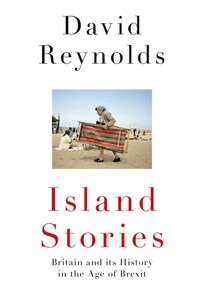ISLAND STORIES
BRITAIN AND ITS HISTORY
IN THE AGE OF BREXIT
David Reynolds
William Collins
An imprint of HarperCollinsPublishers
1 London Bridge Street
London SE1 9GF
WilliamCollinsBooks.com
This eBook first published in Great Britain by William Collins in 2019
Copyright © David Reynolds 2019
Front cover photograph © Martin Parr/Magnum Photos
David Reynolds asserts the moral right to be identified as the author of this work
A catalogue record for this book is available from the British Library
All rights reserved under International and Pan-American Copyright Conventions. By payment of the required fees, you have been granted the non-exclusive, non-transferable right to access and read the text of this e-book on-screen. No part of this text may be reproduced, transmitted, down-loaded, decompiled, reverse engineered, or stored in or introduced into any information storage and retrieval system, in any form or by any means, whether electronic or mechanical, now known or hereinafter invented, without the express written permission of HarperCollins
Source ISBN: 9780008282318
Ebook Edition © October 2019 ISBN: 9780008282332
Version: 2019-09-13
We have got all we want in territory, and our claim to be left in the unmolested enjoyment of vast and splendid possessions, mainly acquired by violence, largely maintained by force, often seems less reasonable to others than to us.
Winston Churchill, 10 January 1914
Trade cannot flourish without security.
Lord Palmerston, 22 April 1860
Unless we change our ways and our direction, our greatness as a nation will soon be a footnote in the history books, a distant memory of an offshore island, lost in the mists of time, like Camelot, remembered kindly for its noble past.
Margaret Thatcher, 1 May 1979
Vote Leave. Take Back Control.
Brexit campaign slogan, 2016
Contents
Cover
Title Page
Copyright
Epigraph
List of illustrations
Introduction: Brexit Means …?
1. Decline
2. Europe
3. Britain
4. Empire
5. Taking Control of Our Past
Notes
Index
Acknowledgments
About the Author
Also by David Reynolds
About the Publisher
1. ‘Brexit means …’ © Christian Adams (Tim Benson, The Political Cartoon Gallery)
2. ‘Bull and his burdens’, John Tenniel © Punch, 8 February 1879, Vol 76
3. ‘We can fly the Union Jack instead of the white flags …’ © Cummings, Daily Express/Express Syndication, 16 June 1982
4. ‘Er, could I be the hind legs, please?’ © Vicky/Victor Weisz, Evening Standard, 6 December 1962
5. ‘The Double Deliverance’ (1621). © The Trustees of the British Museum.
6. ‘Very Well, Alone’. © David Low, Evening Standard, 18 June 1940.
7. ‘Come on in! Vite! The water’s wunderbar.’ © Cummings, Daily Express, 28 June 1989
8. ‘The United Kingdom: Liberate Scotland now …’ © Lindsay Foyle, 15 January 2012
9. Woodcut from James Cranford, ‘The Teares of Ireland’ (1642). © British Library Board/Bridgeman Images
10. ‘Massacre at Drogheda’ from Mary Frances Cusack, An Illustrated History of Ireland (1868)
11. Mr Punch reviews the fleet at Spithead, Punch, June 1897. © Universal History Archive/Universal Images Group/Getty Images
12. ‘Windrush Betrayal’. © Patrick Blower/Telegraph Media Group Ltd, Daily Telegraph, 18 April 2018
13. ‘The Aliens Act at Work’ (1906). © Jewish History Museum, London
14. ‘We need migrants …’ © Matt Pritchett/Telegraph Media Group Ltd, Daily Telegraph, 30 June 2017
15. ‘It’ll whisk you back to the sepia-tinted 1950s’. © Kipper Williams, In or Out of Europe (2016).
16. ‘Remainers Ahead’, © Grizelda, New Statesman, 13 April 2018
17. ‘Free at Last’ © Patrick Chappatte, New York Times, 23 June 2016.
On 23 June 2016, the British electorate voted to leave the European Union. The margin was arithmetically narrow, yet politically decisive: 51.89 per cent ‘Leave’ and 48.11 per cent ‘Remain’. ‘Leave’ meant ‘out’ but nobody in the governing class, let alone the country, had a clear idea where the country was going. No contingency planning for a ‘Leave’ vote had been undertaken by David Cameron, the Prime Minister who had called the referendum. And Theresa May, who succeeded Cameron after he abruptly resigned, lacked any coherent strategy for exiting an international organisation of which the UK had been a member for close to half a century. Her mantra ‘Brexit means Brexit’ initially sounded cleverly Delphic. By the end of her hapless premiership in July 2019, it had become a sick joke. There was still no clear idea what Brexit meant. The country’s future seemed more uncertain than at any time since 1940.
And not just its future; also its past. How should we tell the story of British history in the light of the referendum? Had the turn to ‘Europe’ in 1973 been just a blind alley? Or was the 2016 vote mere nostalgia for a world we (thought we) had lost? Bemused by both future and past, Brexit-era Britons feel challenged about their sense of national identity – because identity has to be rooted in a clear feeling about how we became what we are.
This is not a book about Brexit – its politics and negotiations: these will drag on for years. Instead, I ponder how to think about Britain’s history in the light of the Brexit debate. Because the country’s passionate arguments about the European Union raised big questions about the ways in which the British understand their past. About which moments they choose to celebrate and which to blot out. And about how to construct a national narrative linking past, present and future. Or, more exactly, national narratives – plural – because a central argument of this book is that there is no single story to be told – whatever politicians may wish us to believe.








